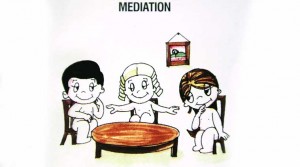In this blog post, Saakshi Jain, student, Amity University, Lucknow Campus writes about Mediation, a must and compulsory process in India. This post also covers the need, advantages, and disadvantages of mediation and its impact on Indian divorces.
Need for Mediation before Divorce Proceedings in India
Mediation is a part of conflict management of the Alternative Dispute Resolution method under Section 89 of the Code of Civil Procedure Code. The emerging concept of mediation centers is rising rapidly.
Mediation is a process of intervening between two parties to resolve disputes. It is an attempt made by a third party who is called a mediator. The mediator is one who is impartial, neutral towards both the parties. Mediators do not give a judgment but allow resolution of the disagreement or disputes between the parties. Under mediation, open communication is held between the parties so that both of them can clear their doubts and misunderstandings and with the help and suggestions of the mediator, come to a common conclusion. Many people before going to the court prefer to go first to the mediation center. Anyone can make a request for mediation by informing in advance through a written notice.
The mediation process is a long process because the mediator needs to analyze the problems and then find the solution to it. Some of the cases may last for 30 days and some for 7 to 8 months. It depends on the case of the client. 
Mediation is a very flexible process as the parties to it decide their own suitable time. Mediation can be used in divorce, labor disputes or bargaining, real estate, and in other disputes so to avoid taking the case to court. Mediation is an informal process to resolve disputes, and the third-party is the mediator who clarifies the misunderstanding between the parties. The misunderstanding can be for a commercial, legal, family matters and many more purposes which need to be solved by an impartial mediator.
At the initial stage, both the parties are not comfortable with revealing their private life to another or a third person. So the communication skills of the mediator should be strong enough to make the parties comfortable and speak out their problems without any privacy problem. The mediator should begin by asking basic questions and when, the parties are comfortable, then only should the deep questioning begin. The communication skills of the mediator should be effective enough to fetch out the problem of the parties and work upon it. Earlier it was not the duty of mediation centers to reconcile the disputes of the couples. But with growing time, to remove the burden of the court and to give a broader look to the Indian judiciary, mediation centers are established and are running successfully.
Types of Mediation
There are two types of mediation:
Mediation through court- Section 89 of the Code of Civil Procedure, 1908 deals with the mediation for pending cases in the court which are referred by the court itself.
Private mediation- Private service is given by qualified mediators. Free service is provided to the court or public members to resolve their disputes regarding any matter. Private Mediation is used to resolve the disputes pending in court and pre-litigation disputes.
Need for Mediation Centers
There should be a conflict resolving management in a country because every case cannot be of such nature to deal with courts. In many cases, there is only a misunderstanding which can be resolved through the mediation centers. There is no need of going to court.
In fact, the court is overburdened by its pending and upcoming cases. Litigation is a very slow process and takes the time to come to any conclusion. Therefore, there is a great need for mediation centers in India to solve minor disputes so that no litigation process is taken further. But if the parties are not satisfied with the conclusion of the mediation center and find that nothing is well, then they can move towards the court. Therefore, the basic and foremost need of mediation is to avoid going to court and resolve the dispute in a normal and confidential way.
Mediation in Divorce
Nowadays, many cases have been registered among young couples for divorce. They fight for a small reason and make it a big one. Sometimes one feels that there is a huge problem, but when one sits backs and looks at it, the problem isn’t that huge, it’s just the two partners who make an issue out of it. Divorce can be initiated by either of the spouses. The major reason for this initiation is a lack of trust, love, care, respect, cruelty, etc. so when a couple feels that there is some possibility to save the relation, they approach the mediation center.
Mediation centers have their process of handling the case in their way. Hence, couples are first referred to go for mediation and then move towards the court. Mediators are usually appointed by the court. The court appoints the mediators according to their qualifications for particular matters.
Advantages and Disadvantages
There are certain advantages and disadvantages to the mediation process for divorce.
Advantages: Mediation cuts the price and the long process of litigation. It is a confidential and ethical process and does not harm the sentiments of either party. A neutral person assists the matter and hence, derives a conclusion which fits perfectly for both parties. Therefore, it is a neutral process. Mediation is a simple and flexible process and does not need much formality to it.
Disadvantages: Under the mediation process, the mediator cannot compel or force either of the party to cooperate. It is one’s choice whether to co-operate or not. Hence, the divorcing couples should firstly try to solve the problem on their own and then only go for mediation if no results are found.
Duty of the Court
Section 9 of the Family Court Act, 1984 states the duty of the Family Court to make efforts for a settlement.-
- In every suit or proceeding, endeavor shall be made by the Family Court in the first instance, where it is possible to do so consistent with the nature and circumstances of the case, to assist and persuade the parties in arriving at a settlement in respect of the subject-matter of the suit or proceeding and for this purpose a Family Court may, subject to any rules made by the High Court, follow such procedure as it may deem fit.
- If in any suit or proceeding, at any stage, it appears to the Family Court that there is a reasonable possibility of a settlement between the parties, the Family Court may adjourn the proceedings for such period as it thinks fit to enable attempts to be made to effect such a settlement.
- The power conferred by sub-section (2) shall be in addition to, and not in derogation of any other power of the Family Court to adjourn the proceedings. [1]

Section 9 of the Family Court Act, makes is it mandatory to settle a matrimonial dispute in relation to maintenance, child custody, divorces, etc., through the process of mediation. It also states to refer the parties to visit a mediation center with their consent. The family court can take the help of the counselors if needed for resolving disputes. Mediation centers should give a time limit for the completion of the conflict dispute to avoid further or unnecessary delay in the matter.
In the case of K. Srinivas Rao vs. D.A.Deepa [2], the apex court held that mediation is a must before a divorce. When any case occurs under Section 489A of IPC, the apex court directs the criminal courts not to deal with this complaint unless the matter is dealt by the mediation centers but in few cases where the cruelty amounts to be a very rigorous and a dangerous one, the criminal courts can take up the case without referring it to the meditation centers. Further, it has been held that all the mediation centers should set up their own personal litigation clinics so that the matrimonial disputes can be resolved under this without going to court.
By the statistical data of Bangalore mediation, over 20, 000 cases of 30, 000 have been settled through mediation in the year of 2007 to 2014.
Conclusion
Mediation is a negotiation process. Parties who go through the mediation process participate directly and with free consent to this process. Resolving the disputes through a process which is under the supervision of a mediator is called mediation. The aim of mediation is to provide a fair, neutral, speedy decision or conclusion to the parties. Meditation can be done for any matter. But nowadays, the concerned topic is Divorce. Mediation for divorce is a must process and needs to be done before going to the court. Through mediation, the burden of the court becomes less and the parties can confidently make their point clear to each other. Mediation is a non-judicial and informal process that needs to be done by the divorcing couples. Mediation centers do not pass the judgment but give the couples solutions to smoothly repair the cracks in their marriage. After the mediation process, the divorcing couples may give another chance to their relationship or file a petition for divorce in the court. After the mediation process, the divorce becomes a mutual divorce with the consent of both the spouse. Section 9 of Family Court Act, 1984 also states that before going to the court, the partners need to go through the mediation process. Therefore, mediation is a must for all the divorcing couples to give their marriage one more chance.
[divider]
Footnotes:
[1] https://indiankanoon.org/doc/1558811/
[2] Civil Appeal No. 1794 of 2013
 Serato DJ Crack 2025Serato DJ PRO Crack
Serato DJ Crack 2025Serato DJ PRO Crack











 Allow notifications
Allow notifications



Hello, I enjoy this article and I would like to repost this on my site. Can I get more information about you so that I can give you proper credit? Thank you and kind regards.
[…] The power conferred by sub-section (2) shall be in addition to, and not in derogation of any other power of the Family Court to adjourn the proceedings. [1] […]